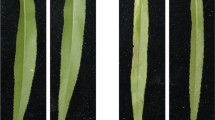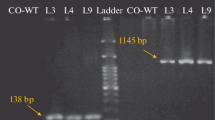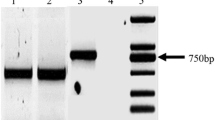Abstract
Expansin is a vital plant cell wall protein that loosens cell wall components and increases cell flexibility. This study aimed to evaluate its association with salt stress defense. The results showed that an expansin gene SmEXPA13 was express induced in salt conditions; the expression was 9.8% and 29.1% higher than the control in the roots and leaves of the salt-tolerant Salix matsudana variety 9901. The cloned fragment was introduced into the Nicotiana tabacum L. plants via leaf disc method. The three determined transgenic tobacco lines showed better performance under salt treatment than wild-type plants. The relative electrical conductivity and malondialdehyde content of the transgenic lines was averagely 24.36% and 26.4% lower than the wild-type plants in 50 mM/L NaCl condition, and 26.92% and 19.57% lower in 100 mM/L NaCl condition. Absorption and accumulation of Na+ were significantly decreased in the transgenic plants compared to wild-type plants, while that of K+ was increased, indicating SmEXPA13 efficiently balanced the Na+/K+ levels. SmEXPA13 was recognized as a gene resource for plant salt tolerance breeding.
Key message
Over-expressing an expansin gene SmEXPA13 from the salt tolerant willow variety 9901 in tobacco plants showed enhanced salt tolerance that would contribute a new insight to salt tolerance mechanism by cell wall contro and be an important gene resource for plant molecular breeding.





Similar content being viewed by others
Data Availability
Sequence data that support the findings of this study have been deposited in the GenBank with the primary accession code BankIt2643366 SmEXP13 OP819081.
References
Ashwin Narayan J, Chakravarthi M, Nerkar M et al (2021) Overexpression of expansin EaEXPA1, a cell wall loosening protein enhances drought tolerance in sugarcane. Ind Crop Prod 159:113035
Baker C, Mock N (1994) An improved method for monitoring cell death in cell suspension and leaf disc assays using Evans blue. Plant Cell Tissue Organ Cult 39:7–12
Chen Y, Han Y, Kong X et al (2017) Ectopic expression of wheat expansin gene Taexpa2 improved the salt tolerance of transgenic tobacco by regulating na + /K + and antioxidant competence. Physiol Plant 159:161–177
Chen S, Luo Y, Wang G et al (2020) Genome-wide identification of expansin genes in Brachypodium distachyon and functional characterization of BdEXPA27. Plant Sci 296:110490
Chen S, Ren HY, Luo YX et al (2021) Genome-wide identification of wheat (Triticum aestivum L.) expansin genes and functional characterization of TaEXPB1A. Environ Exp Bot 182:104307
Cosgrove D (2000) New genes and new biological roles for expansins. Curr Opin Plant Biol 3:73–78
Cosgrove D, Bedinger P, Durachko D (1997) Group I allergens of grass pollen as cell wall-loosening agents. PNAS 94(12):6559–6564
Detain A, Bhowmik P, Leborgne-Castel N et al (2022) Latest biotechnology tools and targets for improving abiotic stress tolerance in protein legumes. Environ Exp Bot 197:104824
Endler A, Kesten C, Schneider R et al (2015) Mechanism for sustained cellulose synthesis during salt stress. Cell 162:1353–1364
Feng X, Xu Y, Peng L et al (2019) TaEXPB7-B, a β-expansin gene involved in low- temperature stress and abscisic acid responses, promotes growth and cold resistance in Arabidopsis thaliana. J Plant Physiol 240:153004
Geilfus C, Ober D, Eichacker L et al (2015) Down-regulation of ZmEXPB6 (Zea mays beta-expansin 6) protein is correlated with salt-mediated growth reduction in the leaves of Z. mays L. J Biol Chem 290:11235–11245
Goh H, Sloan J, Dorca-Fornell C et al (2012) Inducible repression of multiple expansin genes leads to growth suppression during leaf development. Plant Physiol 159:1759–1770
He X, Zeng J, Cao F et al (2015) HvEXPB7, a novel β-expansin gene revealed by the root hair transcriptome of tibetan wild barley, improves root hair growth under drought stress. J Exp Bot 66:7405–7419
Hepler N, Cosgrove D (2019) Directed in vitro evolution of bacterial expansin BsEXLX1 for higher cellulose binding and its consequences for plant cell wall-loosening activities. FEBS Lett 593:2545–2555
Hussain K, Nisar MF, Majeed A et al (2010) What molecular mechanism is adapted by plants during salt stress tolerance? Afr J Biotechnol 9:416–422
Jadamba C, Kang K, Paek N et al (2020) Overexpression of rice expansin7 (Osexpa7) confers enhanced tolerance to salt stress in rice. Int J Mol Sci 21:454
Kende H, Bradford K, Brummell D et al (2004) Nomenclature for members of the expansin superfamily of genes and proteins. Plant Mol Biol 55:311–314
Kronzucker H, Britto D (2011) Sodium transport in plants: a critical review. New Phytol 189:54–81
Kwon Y, Lee H, Kim K et al (2008) Ectopic expression of expansin3 or expansin beta 1 causes enhanced hormone and salt stress sensitivity in Arabidopsis. Biotechnol Lett 7:1281–1288
Liu W, Xu L, Lin H et al (2021) Two expansin genes, AtEXPA4 and AtEXPB5, are redundantly required for pollen tube growth and AtEXPA4 is involved in primary root elongation in Arabidopsis thaliana. Genes 12:249
Lu P, Kang M, Jiang X et al (2013) RhEXPA4, a rose expansin gene, modulates leaf growth and confers drought and salt tolerance to Arabidopsis. Planta 237:1547–1559
Mcqueen-Mason S, Cosgrove D (1994) Disruption of hydrogen bonding between plant cell wall polymers by proteins that induce wall extension. PNAS 91:6574–6578
Minoia S, Boualem A, Marcel F et al (2016) Induced mutations in tomato SlExp1 alter cell wall metabolism and delay fruit softening. Plant Sci 242:195–202
Phang T, Shao G, Lam H (2008) Salt tolerance in soybean. J Integr Plant Biol 50:1196–1212
Sampedro J, Cosgrove D (2005) The expansin superfamily. Genome Biol 6:242
Sanchez-Montesino R, Bouza-Morcillo L, Marquez J et al (2019) A regulatory module controlling GA-mediated endosperm cell expansion is critical for seed germination in Arabidopsis. Mol Plant 12:71–85
Shao Y, Feng X, Nakahara H et al (2021) Apical-root apoplastic acidification affects cell wall extensibility in wheat under salinity stress. Physiol Plant 173:1850–1861
Somerville C, Youngs H, Taylor C et al (2021) Feedstocks for lignocellulosic biofuels. Science 329:790–792
Sun W, Yao M, Wang Z et al (2020) Involvement of auxin-mediated CqEXPA50 contributes to salt tolerance in Quinoa (Chenopodium quinoa) by interaction with auxin pathway genes. Int J Mol Sci 23:8480
Verma V, Ravindran P, Kumar P (2016) Plant hormone-mediated regulation of stress responses. BMC Plant Biol 16:1–10
Xu Q, Xu X, Shi Y et al (2014) Transgenic tobacco plants overexpressing a grass PpEXP1 gene exhibit enhanced tolerance to heat stress. PLoS ONE 9:e100792
Yang Y, Guo Y (2017) Elucidating the molecular mechanisms mediating plant salt-stress responses. New Phytol 217:523–539
Zhang H, Xu Q, Xu X et al (2017) Transgenic tobacco plants expressing grass AstEXPA1 gene show improved performance to several stresses. Plant Biotechnol Rep 11:331–337
Zhang H, Liu H, Yang R et al (2019) Over-expression of PttEXPA8 gene showed various resistances to diverse stresses. Int J Biol Macromol 130:50–57
Zhao S, Zhang Q, Liu Y (2021) Regulation of plant responses to salt stress. Int J Mol Sci 22:4609
Acknowledgements
The authors wish to thank National Natural Science Foundation of China (#31870648) for funding support.
Author information
Authors and Affiliations
Contributions
All authors contributed to the study conception and design. Junkang Zhang and Ruixia Yang performed material preparation and research; Yan Wang, Xue Wang, and Lei Wang participated in the physiological index tests; Junkang Zhang, Ruixia Yang and Jichen Xu wrote the paper. All authors read and approved the final manuscript.
Corresponding author
Ethics declarations
Conflict of interest
The authors declare that they have no conflict of interest or competing interests.
Ethics approval
This article does not contain any research involving humans and/or animals.
Additional information
Communicated by Sergio J. Ochatt.
Publisher’s Note
Springer Nature remains neutral with regard to jurisdictional claims in published maps and institutional affiliations.
Rights and permissions
Springer Nature or its licensor (e.g. a society or other partner) holds exclusive rights to this article under a publishing agreement with the author(s) or other rightsholder(s); author self-archiving of the accepted manuscript version of this article is solely governed by the terms of such publishing agreement and applicable law.
About this article
Cite this article
Zhang, J., Yang, R., Wang, Y. et al. The expansin gene SmEXPA13 in Salix matsudana in association with plant salt tolerance. Plant Cell Tiss Organ Cult 154, 219–225 (2023). https://doi.org/10.1007/s11240-023-02550-2
Received:
Accepted:
Published:
Issue Date:
DOI: https://doi.org/10.1007/s11240-023-02550-2




